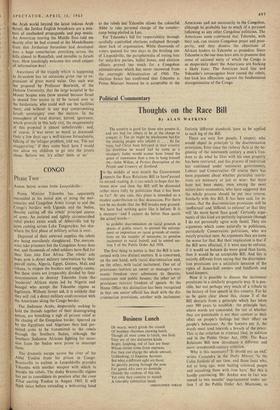CONGO Phase Two
AARON SEGAL writes froin Leopoldville :
Prime Minister Tshombe has apparently succeeded in his initial aim_ of using the mer- cenaries and Congolese Army troops to seal the Congo's borders with Uganda and- the Sudan, thereby cutting off the rebels' principal source of arms. An isolated and tightly circumscribed rebel pocket exists south of Albertville fed by alms coming across Lake Tanganyika; but else- where the first phase of military action is over.
Deprived of their external supplies the rebels are being mercilessly slaughtered. The,mercen- aries take prisoners but the Congolese Army does not, and thousands of rebel soldiers have fled for their lives into East Africa. The rebels' sole hope now is direct military intervention by their Patron states, Algeria, Egypt, Guinea, Mali. and Ghana, to reopen the borders and supply routes. But these states are irreparably divided by their determination to destroy Tshombe from the 'moderate' African states led by Nigeria and Senegal who accept the Tshombe regime as legitimate. Without Soviet aid, it is unlikely that they will risk a direct military confrontation with the Americans along the Congo border.
The Sudanese Arabs, desperately seeking to hold the threads together of their disintegrating nation, are breathing a sigh of private relief at the closing of the Congolese border. Spurred on by the Egyptians and Algerians they had per- mitted arms to be transmitted to the rebels through the Southern Sudan, although the Southern Sudanese Africans fighting for seces- sion from the Sudan were prone to intercept them.
The dramatic escape across the river of the Abbd Youlou from his prison in Congo- Brazzaville to asylum in Leopoldville provides Tshombe with another weapon with which to Shackle the rebels. The shaky Brazzaville regime has yet to consolidate its position after the coup ctelat ousting Youlou in August 1963. It will think twice before extending a welcoming hand
to the rebels lest Tshombe allows the colourful Abbd to take personal charge of the counter- coup being plotted in Leo.
Yet Tshombe's bid for respectability through carefully controlled elections collapsed through sheer lack of organisation. While thousands of voters queued for two days in the broiling sun of Leopoldville, the paraphernalia of voting lists for sixty-five parties, ballot boxes, and election officers proved too much for a Congolese administration- which has never recovered from the overnight Africanisation of 1960. The election fiasco has confirmed that Tshombe is Prime Minister because be is acceptable to the Americans and not necessarily to the Congolese, although he probably has as much of a personal following as any other Congolese politician. The Americans seem convinced that Tshombe, with their aid, can restore Congolese peace and pros- perity, and they. dismiss the objections of African leaders to' Tshombe as prejudice. Since Tshombe is the one man least able to promote that sense of national unity of which the Congo is so desperately short the Americans are backing a likely loser. The American hard line and Tshombe's intransigence have routed the rebels, but look less efficacious against the fundamental disorganisation of the Congo.






























 Previous page
Previous page